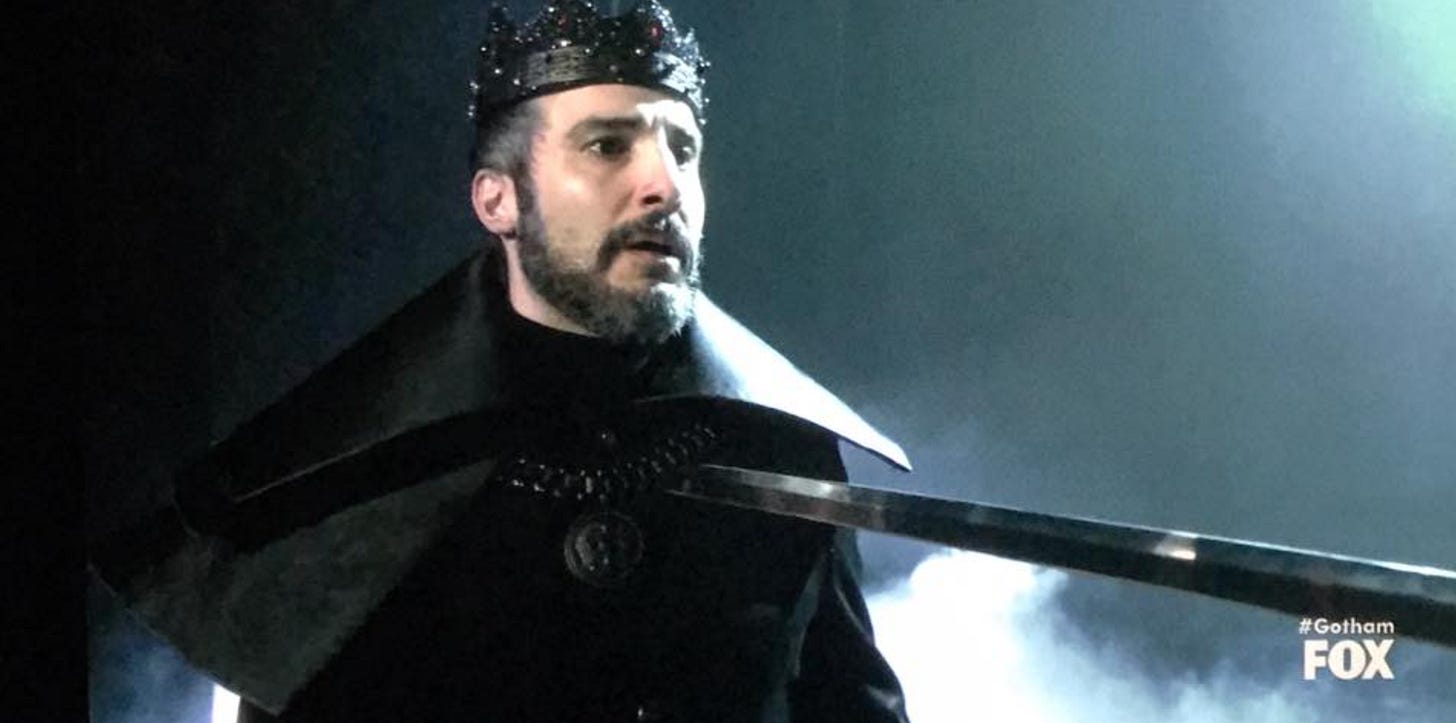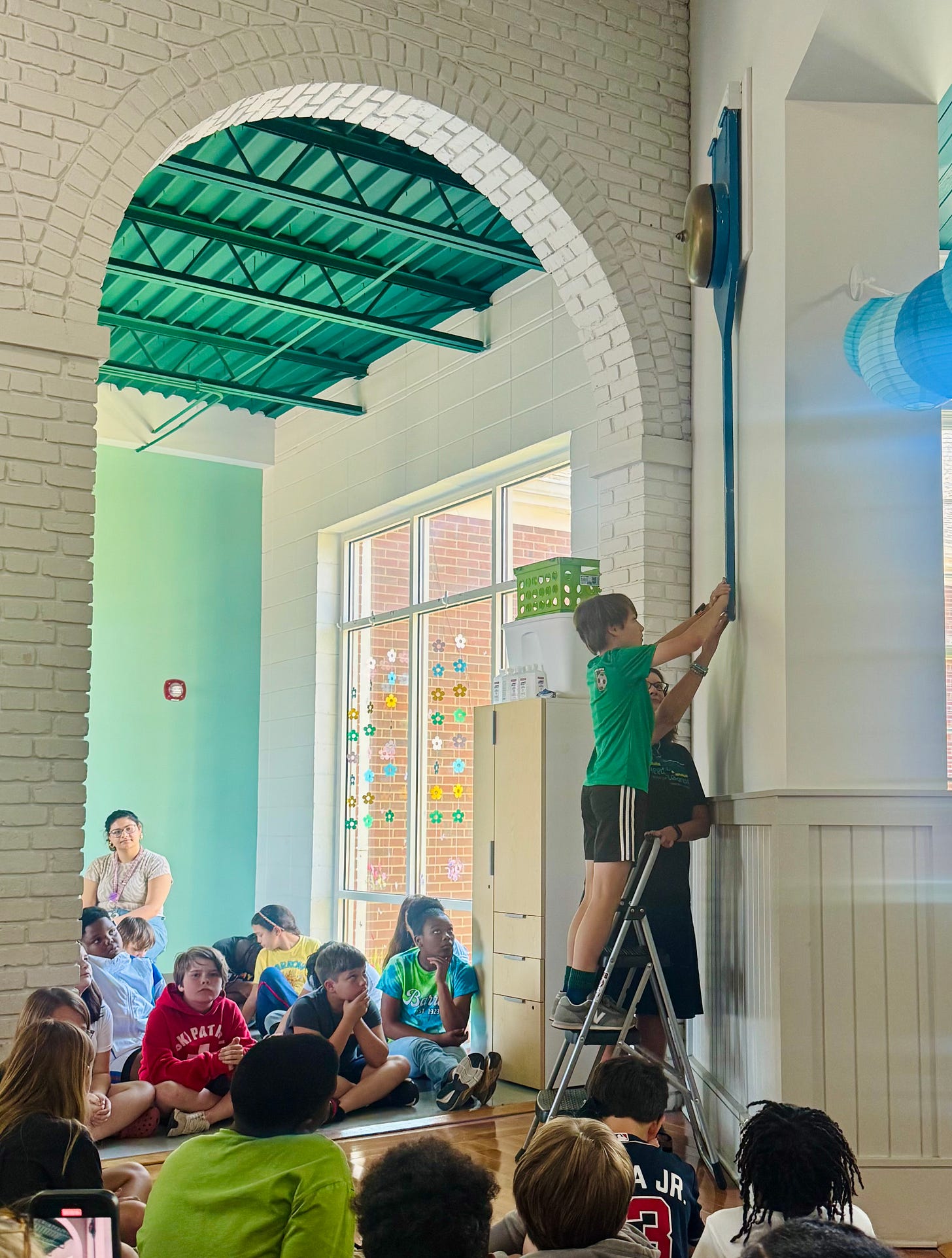Volume 5, Issue 73: The Every
"People think the world is out of control. They want someone to stop the changes."
The book is out. It has been a wild first week, but a very successful one. I hope you have bought your copy. If you have not, there is no time like the present: Buy now.
As a sports fan, most of the games I watch are ones in which I have a definitive rooting interest: You should know that your party animal narrator spent his Friday evening simultaneously yelling in joy at his office television showing the Cardinals game and yelping in pain at his laptop showing the Knicks game. But I also regularly watch games between two teams I have no particular loyalty toward one way or another. I have developed a clear strategy for deciding whom I’m cheering for in these games: I watch them. If you are not sure who you want to win a game, simply watch for a little while—you will find yourself leaning toward one team over the other without necessarily trying to. The game itself will tell you. You often don’t know what you want, or even where you’re going, until you’re already on the road.
Roger Ebert once wrote “the muse visits during the act of creation, not before,” which is a fancy way of saying get to work; you’ll figure it out. Whatever your field of pursuit, no matter how well you plan, you can’t fully prepare yourself for everything you’re going to encounter. You just have to start—you just have to do it. We pick up everything we need along the way. The journey and the destination are inextricably linked; how you got there, and where you were ended up, are the exact same story.
There has been much talk this week about a story we had in New York magazine about how prevalent using ChatGPT to cheat in college has become. The story uses one particular sociopath as its primary anecdote—This is not a person I want to meet: When I asked him why he had gone through so much trouble to get to an Ivy League university only to off-load all of the learning to a robot, he said, “It’s the best place to meet your co-founder and your wife.”—but its overarching premise is that using ChatGPT to write essays is so common that it “threatens to upend the entire academic project.”
I will confess, at the risk of upsetting those in my life who might work in a professorial capacity, that my emotional attachment to “the academic project” is rather minimal. I, personally, found my college classes mostly dull, and I happily cruised through my four years with a smattering of A’s, mostly B’s and my fair share of gentleman’s C’s. But this is not because I didn’t learn anything in college. It’s because I was so obsessed with working for my college newspaper, with writing words and figuring out my voice, with producing what Ebert called “his three favorite words in the English language: ‘By Roger Ebert’,” that I found my schoolwork a distraction, something I had to take care of so I could get my diploma but ultimately less interesting or vital than the act of producing new, original work to be published every single day. I fell in love with the words “By Will Leitch” in college, with constantly writing, with the structure of deadlines, with the discipline that came with having to be a little bit better today than you were the day before. That was what mattered to me in college, not the classes themselves. I regret this a little today—I’d be a lot smarter about a lot of things I’m currently dumb about it, I suspect, if I’d have paid more attention or attended more classes—but the fact remains: I’m inherently a doer. I never considered grad school; I barely got my bachelor’s degree. Academia was never for me.
But these I still think these college students are doing themselves an incredible disservice. (And this is not even accounting for how many things AI gets wrong in the first place.) The point of writing an essay—any essay, in any field—is not to make yourself into a great writer, to show off your prose style, or even, primarily, to display your understanding of the material. The point is to think. To sit and write something down, independent of whatever words you use or, even, how the person reading it responds to it (or even sometimes whether anyone is reading it at all), is to process how you think about it—to figure out how you feel. One of the primary mistakes people make about writing is that they worry about a theoretical audience; they think the main point of writing is making sure it is read. But while that may be true for Stephen King or Maureen Dowd, for regular people, the main person who matters is you: The person doing the writing. It’s for you, not them. How do you feel about the topic you’re writing about? The way to find out is to write about it. By the end, you’ll know.
Allowing a computer to do this—to offload the actual process of thinking—is to sell yourself out. The ordinarily reliable Jonathan V. Last wrote about this this week and got it exactly wrong:
The point of assigning papers isn’t to teach kids how to write—it’s to test to see if kids have done the reading. And the reading is the most important part of the educational process, followed closely by the absorption of whatever insights the professors can impart. Writing papers is just a way of spot checking that process in order to assign grades to it. Which is another way of saying: busy work. So who cares if kids use ChatGPT to break that paradigm?
Now, I can’t speak to what purpose professors have in mind when they assign a paper—maybe it is merely a test to see if they have done the reading. But it sure would seem that the point of writing an essay about a topic is not to prove that you’ve done the reading, but to prove you have thought about what you’re supposed to be learning. This is what we’re doing here, yes? A recitation of facts in a linear order is pointless; what matters is that the material has engaged your brain, that you can wrestle with it, that you have taken information and made it yours. If college is about “spot checking,” then we have lost the plot entirely.
I do wonder if that is the overarching problem: The obsession with “grades” in the first place. As college as become so commodified, a place that is supposed to introduce you to new ideas, to challenge you, to widen your perspective beyond its previously limited scope, has veered utilitarian. The goal isn’t to learn or expand; it’s to “achieve,” to find some sort of competitive advantage, to justify secondary education’s exorbitant expense. Is it any wonder that students are bypassing the notion of learning anything and heading straight to doing whatever is most likely to get them a good grade? I am not sure the fault is entirely theirs.
But this is still no excuse for students—or any of us—to outsource the actual process of thinking. That’s what writing is: It’s thinking. It’s not a test. It’s not an art project. It is an actual labor dedicated to thought. Taking the thoughts out of your brain and inserting them into the physical world is a vital part of being alive. Skipping it, fast-forwarding to the end, is to miss the whole point of everything. Maybe you’re using ChatGPT to write essays. Maybe you’re using it to write emails. Maybe you’re just using it to come up with dog names. But you are giving part of yourself away for nothing. You are abdicating life itself.
BOOK RELEASE WEEK
Indeed: The book came out this week. It has gone well so far, though it is of course very early. I hope those of you who have received the book already are enjoying it.
I mentioned this in the launch day post, but here is how you can personally help, right now:
Buy it. Wherever you buy your books. Your local bookstore is of course ideal, but whatever is convenient for you; I often find it strange when authors try to shame people from buying their books on Amazon while, of course, shopping on Amazon all the time. I’m so happy anyone wants to buy a book at all that, you know, you do what works for you.
Write it a review. This is more important than you might think. Goodreads is perfect. You don’t have to write a full review, but it wouldn’t hurt. It is actually even more valuable to write one on Amazon, actually, particularly if that’s where you purchased it.
Give it as a Father’s Day gift. I think it would be an excellent one.
Encourage your local bookstore to stock it. They probably already have it—I’ve seen several in the wild already—but it’s always good to keep it front of mind.
Post on social media about it. If that’s your thing. It’s OK if it’s not. (It’s not really mine either. But it does not hurt.)
And here I was talking about it on “Morning Joe” this week.
And finally, I was delighted to get to talk to Chris Andrew Ciulla, who did the narration for the audiobook. I’m halfway through his work; he did a terrific job.
Let’s get to know him! Other than the fact that he’s a Boston sports fan, he’s pretty great.
So how did you get started doing this?
You could say I'm a "failed" film, TV and commercial actor that was pursuing all those in LA for 15 years. But one day in 2009, I was walking around a Barnes & Noble in Woodland Hills (to avoid the 120-degree heat outside), and saw these plastic boxes on a shelf. And I said, "THOSE AREN'T BOOKS!". I thought they were mini-monoliths from 2001:A Space Odyssey, so I was immediately attracted. I grabbed one and noticed it was written by John Grisham, and the narrator was Michael Beck. I said to myself, "HE WAS SWAN IN THE WARRIORS! HE WAS IN XANADU! AND..." I couldn't come up with anything besides a Matlock or a Murder, She Wrote for him. Turns out, he's a kickass audiobook narrator. And the seed was planted. Three years later, I researched the best coaches, and had some demos made (That's what you need in all VO categories need to market yourself.) And it took a good solid three years to get objectively good at it. Since then, I've knocked out an average of 60 books a year since 2016.
What’s your preparation process like?
I read the book before I narrate the book. (FYI All narrators should do this.) Then, I figure out what voice characteristics are best for what characters, based on what's on the page, the genre, and my personal vocal skill set. I also figure out as specific a POV of the narrator of the story as possible, so the listener has the best guide in the storytelling. If necessary, I'll get in touch with the author thru the publisher, and ask specific questions that might be open-ended in the book.
Have you ever had to do a book that you absolutely could not stand? (Current book excluded.) How did you get through it?
I've had several. But once we're given the opportunity to narrate a book, we must consider it as the best book ever written. Tolstoy, if you will. And I always tell my narration students...sometimes our job is to make a 3 into a 7, without the listener knowing it. That's the important part. Love the story for whatever it is, and love the opportunity to be a storyteller.
I love how all narrators seem to end up knowing each other. Is there a hotel like in John Wick?
HAHA...indeed. There's actually an organization called the APA (Audio Publishers Association) that puts together a yearly conference where we all hang out together as equals. And yes, it's a close-knit group of veterans and those who have lasted through good times and bad who support each other in our endeavors. Keep in mind that full-time narrators are the true garbage pail-carrying members of the performance sect. We work more hours a week than all other categories, including Musical Theater actors.
Was there anything particularly challenging about this book? About being Lloyd?
You wrote a terrific story that was incredibly relatable in difficult circumstances. Even though Lloyd decides to make strong choices to protect his son and family, it's still within the realm of someone dealing with what he's dealing with. So it allowed me to feel free in becoming him and all the people around him. Albeit funny and heightened at times, it still has a tremendously relatable quality to it.
If there was anything difficult to narrate, it's the scenes between him and his son. I miss my Dad. He died a bit too early, and as an actor who uses substitution often, some of those scenes become quite emotional for me.
You’re a sports guy. Not just that: You’re a BOSTON sports guy. Are the Celtics winning it all this year? Aren’t you guys TIRED of winning championships? Do you kind of miss being angry all the time in the pre-2004 days?
Because I'm late in responding to you, we now know the answer to the Celtics question. I thought they would have, but you can't choke away two consecutive 20-point lead nights at home and expect to beat anybody, nevermind a gutsy Knicks team. And I feel terrible for Jayson Tatum, but he's a great guy and will bounce back even better than before. It's wonderful motivation. And yes, I remember the Steve Grogan Pats years, good sir. I know what it's like to have a Hugh Millen jersey. You can never win enough after those years.
Plug some stuff!
I'm CEO of an audiobook publishing and production company called Leonardo Audio. It allows me creative control on audiobooks that swings me back to the days of pitching TV and Film projects in LA. But since this has gone well, we're launching a New England-based digital imprint called Nor'easter. Our first major project is a Boston-based Non-Fiction Sports anthology edited by my good friend Ron Borges (we're both Boxing guys) which will focus on the Big 4 Boston sports teams and include Bob Ryan, Tom Curran, Dale Arnold, Upton Bell, and other legendary sports reporters of my youth. It's surreal that I'm able to do this. I'm very lucky.
Here is a numerical breakdown of all the things I wrote this week, in order of what I believe to be their quality.
How the Knicks Make the NBA Finals, New York. This one … got dated fast.
Seven Potential MVPs Who Haven’t Won One Yet, MLB.com. Wouldn’t it be something if Juan Soto never actually got one.
I Was Part of a Washington Post Panel About Pete Rose, The Washington Post. Thus ends just about everything I have left to say about Pete Rose.
This Week’s Power Rankings, MLB.com. I’m a little worried this is as high as the Cardinals will be all year.
PODCASTS
Grierson & Leitch, Grierson is in Cannes, but an interview we taped about the book went up on launch day. We’re taping a new show tomorrow.
Morning Lineup, I did Monday’s and Friday’s shows.
Seeing Red, Bernie Miklasz and I got maybe a little too excited about the Cardinals.
LONG STORY YOU SHOULD READ THIS MORNING … OF THE WEEK
“In Chicago, Will the Pope Bump Last?” Geraldo Cadava, The New Yorker. As someone with many Catholic friends from the Chicagoland area, I enjoyed this deeper dive.
ONGOING LETTER-WRITING PROJECT!
This is your reminder that if you write me a letter and put it in the mail, I will respond to it with a letter of my own, and send that letter right to you! It really happens! Hundreds of satisfied customers!
Write me at:
Will Leitch
P.O. Box 48
Athens GA 30603
CURRENTLY LISTENING TO
“What’d I Say,” Ray Charles. Still obsessed with the Georgia musicians playlist.
Remember to listen to The Official Will Leitch Newsletter Spotify Playlist, featuring every song ever mentioned in this section. Let this drive your listening, not the algorithm!
Also, there is an Official The Time Has Come Spotify Playlist.
When a fifth grader graduates from the elementary school here, they get to ring a big bell. Wynn got to do that this week.
This house is now officially 50 percent middle schooler.
Have a great holiday weekend, all.
Best,
Will








Thanks, Will, for these thoughts on AI -- it's exactly the way I think about writing, and despair of convincing my students this fall when I teach first year writing. I thought this lovely piece complements yours well: https://internetprincess.substack.com/p/choosing-to-walk
Congratulations, Will, on the release of Lloyd. Walking down to the local bookstore--which happens to be a 10-minute walk from the fairest place on Earth, Wrigley Field--today to buy it.
Agree 100 on the role of AI in higher ed, particularly the paragraph that ends "...I am not sure the fault is entirely theirs".
Respectfully resisting the urge to caption the freeze-frame of Mika. Best of luck with the book! Have a great weekend!